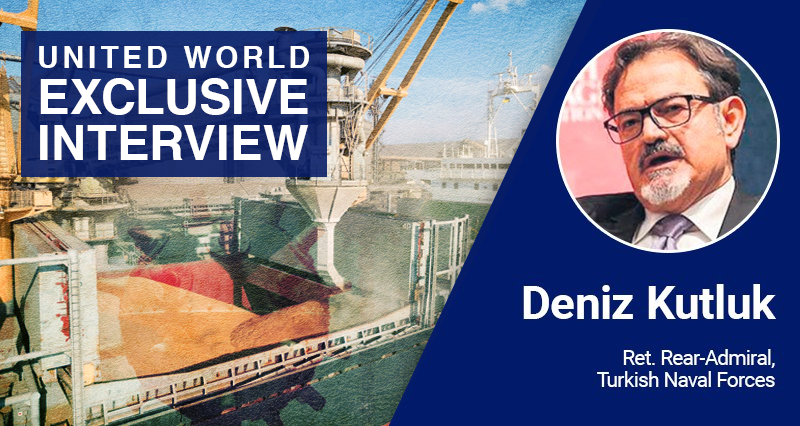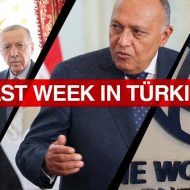NATO has approved a new defense plan on its recent summit in Vilnius, the United States is accelerating moves to increase presence in the Black Sea where the Ukrainian forces continuously attack Russian ships. Meanwhile, Russia has suspended the Grain Corridor agreement.
We spoke to ret. Admiral Ali Deniz Kutluk from the Turkish Naval Forces on all these issues and what they mean for Türkiye. Kutluk warned that NATO presence in the Black Sea could “trigger a Third World War”, calling Ankara to resist such plans.
Kutluk also said that a grain corridor without Russian participation as “impossible”.
On its recent summit, NATO approved a new defense plan. How do you interpret the decision of such a plan?
NATO has already renewed its strategy concept, approved at the previous summit. Here, Russia was defined as a threat. Battle plans are currently being reviewed to comply with this strategy. Therefore, their review has been completed and they have been approved at the summit.
NATO is implementing a military restructuring plan that will encircle Russia in the north of the Atlantic, in the regions close to Russia, and in a second region from the Baltics to the Alps, and in the Black Sea and the Mediterranean as third region, which aims to limit Russia’s possibilities.
Within the scope of this plan, preparations have been made regarding the degree of readiness of the troops, their size, and how they will be used in an emergency. These are presented to the leaders as political authority, let’s say to ‘tacit approval’. I say tacit approval because the main processes for their approval happen through correspondence between the permanent headquarters.
In this context, one of the decisions reflected in the press is to increase NATO’s emergency response force to 300,000 soldiers to be mobilized within a month. How do you interpret this decision?
Yes, such a decision has been made. This is a goal, of course, not something that will happen right away. NATO’s forces were maintained at a low readiness and presence of low active forces, as a defense organization should be. Since the end of the cold war, NATO members were already using dwindling resources.
Now we understand that this has been increased because of Russia’s attack on Ukraine. It has been increased as a target. But 300,000 is a big figure even for NATO. Therefore, we should not expect that this could be done as quickly as said.
However, there are different concepts that we are talking about here.One is that of battle plans, the other is the readiness of the forces.
The degree of readiness of the forces is of course something related to strategy and perceived threat, the actual threat. It is desired to change the degree of preparedness from, let’s say, in the current position of peace, from a position that does not see Russia as a threat to a position that sees it as a threat. But this is a statement made on the basis of principles at the moment. It will take many years to implement this.
Türkiye “will not willingly participate” in NATO decisions
What role do they envision for Türkiye here? It’s about 300,000 soldiers. What can this decision of increased rapid intervention power mean in principle for this decision for Türkiye?
Well, what I said goes for Türkiye as well. These decisions will ultimately bring a budgetary cost to Türkiye as the country will need to allocate forces.
However, there are reasons to think that Türkiye will not willingly participate in these decisions. In other words, it is not easy to implement this decision. Türkiye also has no reason to rush. I think Türkiye will plan a slow participation in these decisions.
Again, before this summit, at the Madrid summit in 2022, NATO defined the Black Sea as a strategic area. At the beginning of this year and at the beginning of 2023, a bill called the Black Sea Security Act was presented to the American Congress. Accordingly, the USA begins to develop a strategy for the Black Sea. One of its subtitles, which was documented in a report in the NATO Parliamentary Assembly, is to establish a permanent NATO force, a naval force in the Black Sea. Montreux has its limitations. However, such a thing began to be discussed, especially under the leadership of Türkiye and with the participation of other riparian NATO countries. How would you comment on this?
It should be considered as an absurd endeavor. This seems to be one of the targets that the US has kept on the shelf and where it is considering to make a move when the environment to pierce the Montreux Agreement. America has tried that a lot. It has tried maybe 10 times since the early 2000s. It backfired every time.
There is no security vulnerability in the Black Sea that concerns NATO. Why not? In fact, there was only one NATO member, Türkiye, in this sea during the Cold War and it was doing what was necessary here. After the Cold War ended, there are now three NATO members, with Bulgaria and Romania. The fourth and fifth countries are already partners of NATO, such as Ukraine, Moldova and Georgia.
Russia was also NATO’s strategic partner. So from 2001 to let’s say 2008, Russia was NATO’s strategic partner. This partnership weakened with the Georgian events in 2008 and the Ukraine events in 2013-14.
But we know that until last year, NATO Russia’s council worked from time to time and lines of communication were open.
The security of the Black Sea is “not an issue for NATO but for littoral states”
Therefore, the Black Sea security has not been affected by the events between Ukraine and Russia. But Black Sea security is a matter of Black Sea littorals in the first place. So this is not a NATO issue. Moreover, since 1936, since it has been accepted as a part of the Lausanne Treaty, one of the Turkish Founding Agreements, the Black Sea security with the Montreux Convention has ensured within a structure that reconciles the security of the littoral states with the security of Türkiye.
And Türkiye is fundamentally opposed to this becoming a sea where NATO seeks adventures. This is Türkiye’s red line. It is not possible to pass this.
Moreover, after the Ukraine war started, the 19th article of Montreux was put into effect, with Ukraine ‘s attention and insistence. According to this article, warships of other countries as well as warring parties are not allowed to enter the Black Sea.
What will it mean for NATO countries to send a force here, waving their arms? It provides the purpose of bringing NATO into the war with Ukraine only against Russia. This means the beginning of a world war. You can’t squeeze a nuclear-powered country like that. What will you do if it gets stuck?
So you’re going to take Russia over? Will NATO invade, take over, or destroy a 17 million square kilometer structure comprised of 85 separate federal republics? These questions are becoming more and more meaningless.
On the other hand, Türkiye is aware of how natural history and geography dominate it, while making foreign policy, and it has to be aware of it. If we look historically, Türkiye participated in the First World War when the Ottoman navy, followed ships Goben and Breslau, entered the First World War and sought an adventure with Russia. This is still remembered. For this reason, we have to find ways not to participate in the 3rd World War. Here the Montreux Agreement keeps us safe.
Being a member of NATO gives us the power to say no in NATO. By responding on a bilateral basis to what America has done on a bilateral basis, of course, they get a response and prevent them.
Taken all together, NATO always using, holding and entering a naval force here makes only sense only if you want to trigger the World War III.
NATO builds on past mistakes of Türkiye in the Black Sea
On the other hand, this traditional Black Sea policy of Türkiye worked flawlessly until 2016. With the downing of a Russian plane in 2016, Türkiye invited NATO to the Black Sea at the NATO summit. This was a big mistake. At the 2017 summit, NATO decided to have a presence in the Black Sea. Another mistake that Türkiye allowed that.
Now NATO wants to build on that and further corner Russia.
In my opinion, both the military and diplomatic representation of Türkiye in NATO should be vigilant against these attempts and prevent them in NATO’s subcommittees.
If it cannot be prevented there, it will have to be prevented in an environment of greater publicity and greater conflict. The case of Finland and Sweden was also postponed until it was difficult to be blocked at the highest level, as can be seen in the same way. However, it could have been possible to prevent them in NATO committees.
Since this opportunity was not used, the President had to oppose them. Therefore, we should not allow this to happen again. NATO’s mechanisms can also be used by Türkiye to keep them from taking steps that it does not see fit in its own interests, without going public. This can be done in subcommittees. Türkiye should use these constructs.
“There needs to be agreement with Russia” for the grain corridor
Is the suggestion that NATO ships accompany the grain corridor, which has been brought up recently, also a part of these initiatives of the USA? To try to undermine Montreux and increase the presence there, which Zelenski also supported. He made this suggestion. Retired NATO commander Stavridis also expressed.
I have a lot of doubts about whether Zelenski is in control of what comes out of his mouth. I believe it was someone else’s prompting.
First of all, the grain corridor mechanism is not a mechanism that will work despite Russia. Because Russia controls the region where these grains originate. Therefore, we cannot think that we can do this under all circumstances.
There needs to be an agreement with Russia. Russia has two main views. First, Ukraine provides 8% of the world’s salable grain and Russia provides 18%. In other words, Russia objected to the prevention of its exports by imposing entry bans on grain supplied by Russia, both by insurance companies and ports.
This grain corridor was not only for Ukrainian grain. It was an emergency situation for 9-10 countries in the world, especially in Africa, that feed on grain.
And then Russia had reached an agreement to sell both Russian and Ukrainian grain to foreign markets. But the practice was not like that. In practice, a process in which Russian ships were rendered inoperable due to insurance deficiencies, lack of acceptance to the port, and swift transfer deficiencies in banking continued. Russia has tolerated this situation several times.
Also, agriculture needs fertilizer to continue. Russia is the largest fertilizer producer in the world. Russia also wanted the obstacles to fertilizer export to be removed.
And when the Ukrainian forces attacked the Crimean bridge – Russia considered it an attack on a humanitarian area, Russia retaliated. He both said ‘I am not in the grain agreement’ and started attacks in the Odessa region in a way that would hit the agriculture and export infrastructure.
As far as I heard, 65 – 70 thousand tons of grains have been destroyed. Loading possibilities are destroyed.
In addition, Russia has declared this area a dangerous area for ship passages. Currently, there is an infrastructure that prevents the entry of ships in the region where the grains will be exported. The area is mined. Now by the Russians. The Ukrainians had mined it before.
Taken together, there is no role for NATO ships in the Black Sea. Such an attempt cannot be carried out in spite of Russia. Also, if there was such a need, Romania, Bulgaria and Türkiye could have carried out on behalf of NATO.
Taken together, this idea is one of the irrational thoughts of those who want to bring NATO into the Black Sea and cause trouble.









Leave a Reply